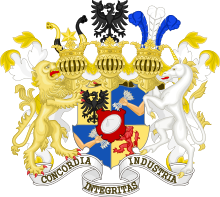This article has multiple issues. Please help improve it or discuss these issues on the talk page. (Learn how and when to remove these messages)
|

The Rothschild banking family of England is the English branch of the Rothschild family. It was founded in 1798 by Nathan Mayer Rothschild (1777–1836), who first settled in Manchester before moving to London, England, which was then part of the Kingdom of Great Britain. He was sent there from his home in Frankfurt by his father, Mayer Amschel Rothschild (1744–1812). Wanting his sons to succeed on their own and to expand the family business across Europe, Mayer Amschel Rothschild had his eldest son remain in Frankfurt, while his four other sons were sent to different European cities to establish a financial institution to invest in business and provide banking services. Nathan Mayer Rothschild, the third son, first established a textile jobbing business in Manchester and from there went on to establish N M Rothschild & Sons bank in London.
From the family's home base in Frankfurt, the Rothschild family not only established itself in London but also in Paris, Vienna and Naples in the Two Sicilies. Through their collaborative efforts, the Rothschilds rose to prominence in a variety of banking endeavours, including loans, government bonds and trading in bullion. Their financing afforded investment opportunities, and during the 19th century, they became major stakeholders in large-scale mining and rail transport ventures that were fundamental to the rapidly expanding industrial economies of Europe.
Changes in governments, wars and other such events affected the family's fortunes, both for their benefit and to their detriment at various times. Despite such changes, the English branch of the Rothschild family is arguably the most prominent of all the Rothschild branches, partly due to its elevation to the British peerage and its continued high-profile philanthropic activities.